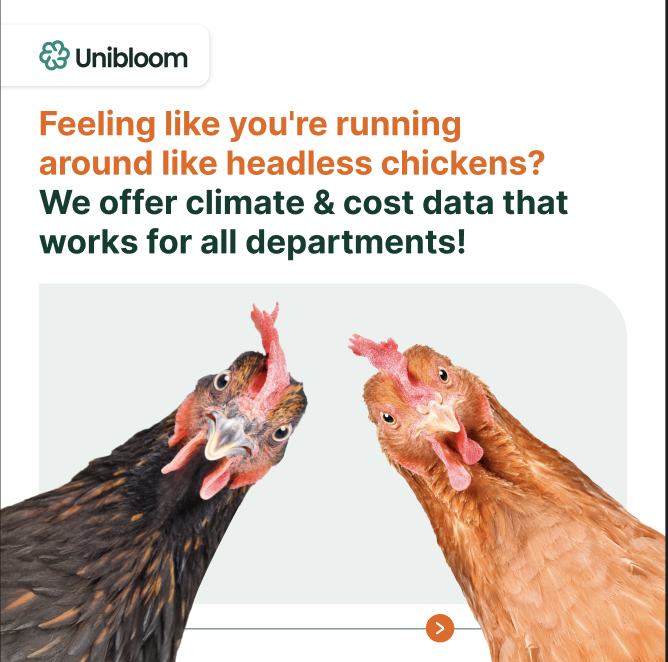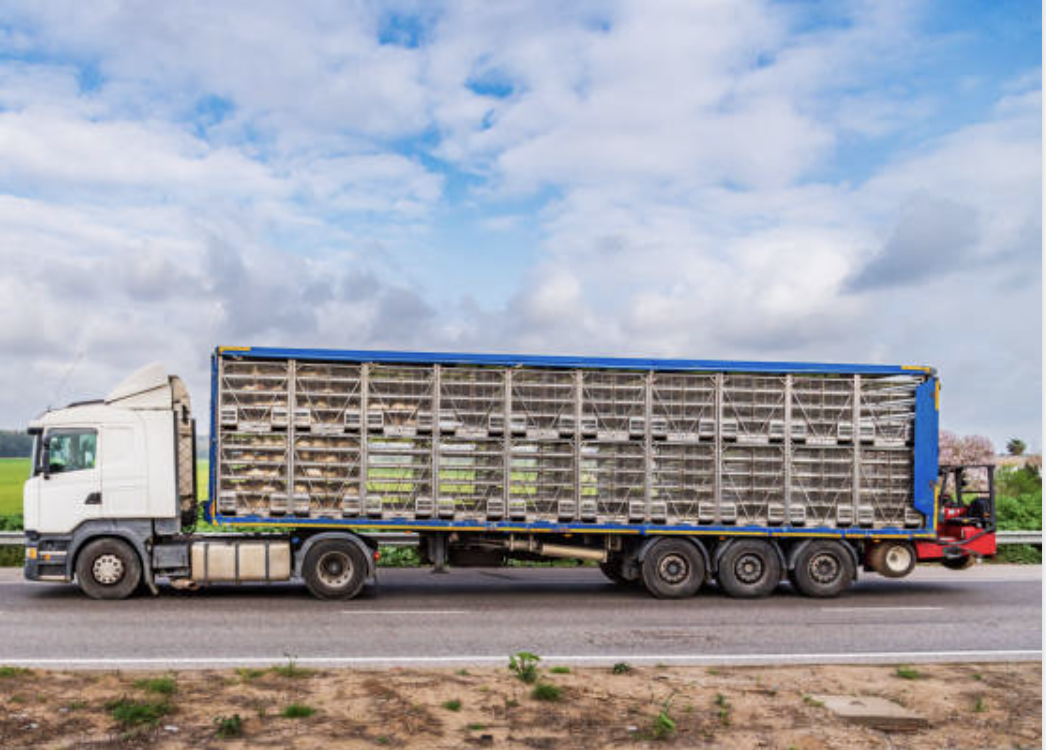Friday in Five with Unibloom
Welcome to the first bi-weekly newsletter from Unibloom where we intend to inspire you with real life business action on climate, biodiversity, nature, circularity and social justice through the lens of driving business value. Coming to you every other Friday, we want to celebrate the wins, draw attention to the challenges and occasionally even mythbust and we guarantee to do it in under five minutes.

Welcome to the first bi-weekly newsletter from Unibloom where we intend to inspire you with real life business action on climate, biodiversity, nature, circularity and social justice through the lens of driving business value. Coming to you every other Friday, we want to celebrate the wins, draw attention to the challenges and occasionally even mythbust and we guarantee to do it in under five minutes.
This is Unibloom's way to support you and your teams to look ahead, plan and prioritise the right actions towards your business and climate targets. We believe that we need a much more collaborative and data-driven approach to achieve the level of transformation all our businesses need to achieve to align with the science, and to grow up to 2030 and beyond.
Summary
- Making the finances work - Denmark the first to move on a carbon tax for livestock.
- Future Fit - Businesses feeling ready to report on CSRD but still lagging behind on technology usage for sustainability.
- Land your climate storytelling - watch a replay of our conversation with Tom Tapper, CEO of Nice & Serious and level of your internal and external storytelling.
- What’s getting us excited this week - London Climate Action Week and business marching for nature in the UK.
Making the finances work: Denmark the first to move on a carbon tax for livestock
Denmark has moved forward with a so-called ‘cow carbon tax’ (although it also covers other livestock). Agricultural emissions are forecasted to account for 46% of Denmark’s total emissions by 2030 and the move from the Danish government will put a tax of circa €40 in 2030, rising up to circa €100 by 2035, for every tonne of CO2e from livestock. As you would expect the policy has been met with mixed reviews, with campaigners feeling it has too many loopholes, and farmers feeling that the tax is pricing them out of the market. However from the government’s point of view they see action on agricultural emissions as key to meeting climate targets. ‘Experts believe the carbon tax will slash 1.8 million tonnes of [CO2e] in 2030, its first year of operation, enabling Denmark to meet its target of cutting 70 percent of its total emissions by that year’. The policy has been structured to ensure that there is a significant tax break for climate efficient farming but the impact on businesses and consumers will be interesting to see. We’ll be watching on to see how the EU and others react.
Future Fit: Business readiness for CSRD
The topic that continues to dominate sustainability circles is without a doubt the range of EU regulations that are coming in over the next few years, and most notably CSRD (The Corporate Sustainability Reporting Directive). The narrative is often one of businesses being in panic mode given the depth of changes that are happening. However, this is not the message that comes through from a recent PWC survey of over 500 execs and senior leaders. Instead they find that businesses feel ready to report (over 93%) and not only that, they feel it is going to have ‘multiple business benefits’.
The report does, however, go on to highlight that, ‘Respondents report high confidence on topics that are generally included in existing disclosures (e.g., workforce, business conduct and climate change) but are far less confident in their ability to meet reporting requirements on less familiar topics such as biodiversity, circularity, pollution and workers in the value chain.’ This is in line with what we are hearing from the majority of businesses, with greater clarity on action plans around carbon in comparison to nature.
One of the hidden benefits of CSRD might well be the need for businesses to take a ‘whole-business approach’ to sustainability with most business departments already being part of the process in over 50% of businesses. This, however, coincides with a clear lack of technology utilisation to drive decision making. Given the nascent and innovative nature (excuse the pun) of much of the sustainability work that is happening across businesses we absolutely need technology to be at the heart of future-fit planning.
Follow Andreas Rasche for lots of good CSRD and EU sustainability updates!
Land your Climate Story with Tom Tapper, CEO at Nice and Serious
Watch a replay of our webinar with the fantastic Tom Tapper here where we talk about all things sustainability comms, focusing on how to build your narrative credibly, both internally and externally. A couple of key things we took from the conversation:
- Celebrate your wins.
- Don’t wait until everything is perfect to communicate because you will be waiting forever.
- Don’t think your sustainability strategy is your sustainability communications strategy. People want to feel a connection to what you’re doing and that doesn’t come from going deep on every detail.
- Great sustainability comms can lead to greater action and this can become a virtuous cycle.
- Adapt your story for an internal vs an external audience. Internally the motivations to drive action are often going to be the business case and risk of inaction, so leverage your business and financial skills to bring the cost savings, value creation, customer collaboration as the key benefits to start implement new way to operate and solutions into your business!
What’s getting us excited this week
Our Founder and CEO, Anna Sandgren, was at the Sustainability Showcase from Female Founders Rise this week surrounded by a range of fantastic female founders leading impact-led businesses. Definitely worth checking out the founders and businesses that showcased:
▪ Zoe Rowswell - Tern Eco
▪ Tuvie Ejoh - Tutu Pikin
▪ Leah Robson - Your Energy Your Way
▪ Jessica McCleave - Ilk & Ernie
▪ Sarah Angold - Fiiba
▪ Charlie Rudkin-Wilson - Müll Club
Planet and Business: Businesses march in support of action on nature
With a couple of ex Ben & Jerry’s members in the team we do love a bit of corporate activism and it was great to see Business Declares out in force at the Restore Nature Now march in London ahead of London Climate Action Week that ran throughout this week. The UK is now one of the most nature depleted countries in the world and the march drew thousands seeking to draw attention to the plight of nature and biodiversity in the UK. There is a huge role for businesses here in taking action but also in speaking up in support of greater action and that is where organisations like Business Declares have a big role to play in supporting collective action across the business community.
Cheers from Chris, Anna & the Climate Action Team at Unibloom
Read more on Unibloom at: www.unibloom.world
Read our 6 pillars for science-based success here




